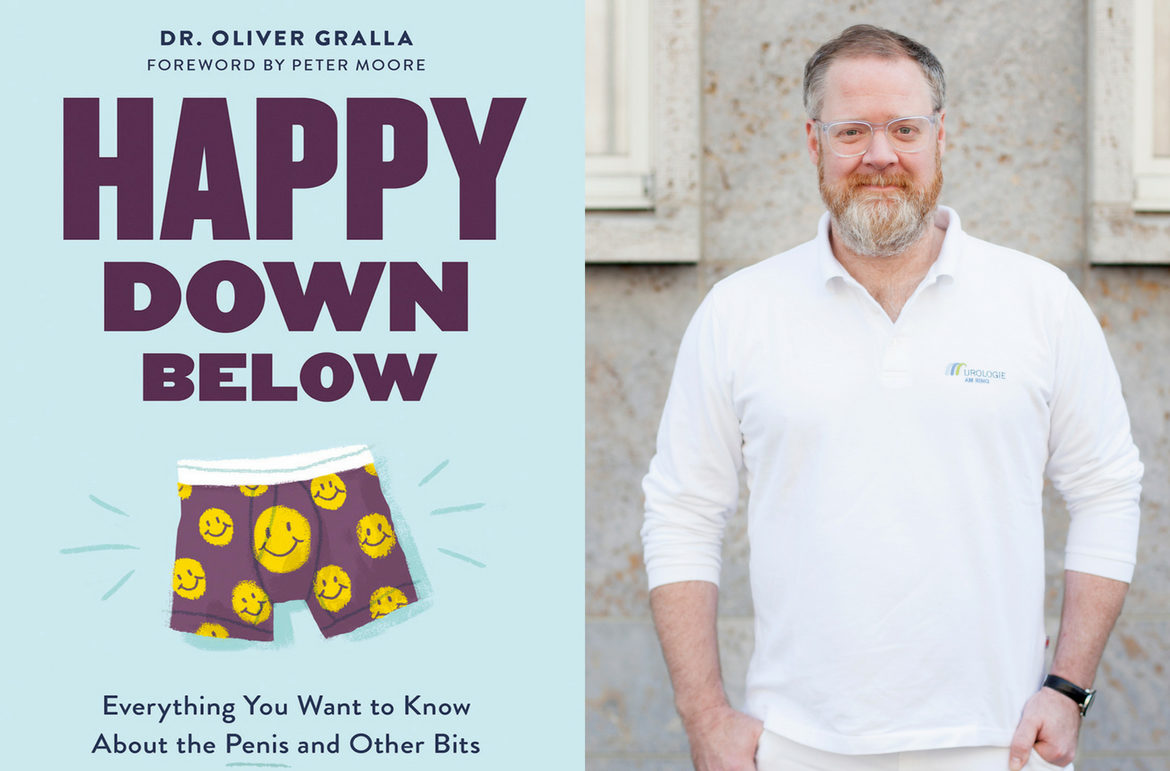Dr. Olliver Gralla is the author of Happy Down Below: Everything You Want to Know About the Penis and Other Bits (Greystone, 2018), an informative and funny guide to men’s health. An acclaimed urologist and andrologist, he is known as “Dr. Sex” in his native Germany. Uncovering the truth and setting down the facts, here are 10 urological myths from Dr. Gralla.
- Erectile Dysfunction only strikes the elderly. Although more common among older men, erectile dysfunction (ED) can affect even teenagers. The younger the man, the more likely the cause is psychological rather than biological.
- Getting pregnant is possible “around” the time of ovulation. While sperm cells can survive for up to five days in the uterus, an oocyte can only survive a maximum of 24 hours. For this reason, conception is only feasible if intercourse occurs on the day of ovulation or several days before, not afterward.
- Testosterone appears only in men. In men, testosterone is produced almost exclusively in the testicles and plays a role in sleep, fertility, libido, and other key functions. But testosterone may affect women, too; research has found that increasing a woman’s testosterone level for a short period of time can boost her libido.
- Big prostate? Big problem. Prostates can reach absurd sizes and can certainly make men’s lives hell. Yet it’s important to note that symptoms do not always correlate to the size of the organ. There are elderly gentlemen with huge prostates and hardly any complaints; others, however, have smaller glands but are severely plagued.
- The higher your PSA level, the higher your risk of prostate cancer. Many people know that PSA levels are tumor markers. PSA stands for prostate-specific antigens, which are produced in the prostate—regardless of whether it is healthy, diseased, enlarged, or old. However, PSA alone is not enough to come to a conclusive diagnosis. Measures such as age and prostate size also factor into the mix.
- Condoms prevent STDs. While condoms are effective at preventing many sexually transmitted diseases, they don’t protect against human papillomavirus (HPV). Even with a condom, HPV can be transferred via skin-to-skin contact in the pubic bone area.
- Prostate medications are for older men only. Special medications used to treat prostate issues in older men can have surprisingly useful side effects; in fact, select
types can be used to treat premature ejaculation—in men of any age. - Once Viagra, always Viagra. It can be difficult to stop using these little blue pills once you’ve started, but there is another option. ESWT, a new, painless procedure that involves bombarding the erectile tissue with low-dose shock waves, has been shown to stimulate the growth of new blood vessels over time, reducing ED symptoms.
- Oysters, asparagus, and hot peppers are powerful aphrodisiacs. Although these foods are tasty, research has failed to find evidence that they boost libido. But this isn’t the case for citrulline, an amino acid found in watermelon peel. Eating citrulline can help widen the blood vessels of the penis and improve erectile function.
- If a woman develops a bladder infection after sex, it’s because of pathogens transmitted to her by her partner. Acute bladder infections often occur after sexual intercourse, but they are mostly induced by female pathogens, presented in the vaginal cavity, not those of the male partner.
With plenty of relatable metaphors, and a light, conversational tone, Happy Down Below by Dr. Gralla presents simple, research-based answers to questions such as: Do male enhancement pills actually work? Why does erectile dysfunction happen, and how is it treated? What is a “normal” penis—and how big is it really? And much, much more.
As many of us know, men are notoriously reluctant to see a doctor. Indeed, only three in five men report going for an annual physical, and approximately 40% only ever visit the clinic when their symptoms become unbearable. Many know little or nothing about their bodies, with dire consequences for their wellbeing. Packed with colourful anecdotes and quirky illustrations, this cheeky guidebook provides a clever and highly entertaining remedy to that situation.
In Happy Down Below: Everything You Want to Know About the Penis and Other Bits (Greystone, 2018), men’s health specialist Dr. Oliver Gralla offers practical tips and clear, accessible explanations for helping men (and women) better understand the male body, learn to care for it, and become more comfortable speaking about it with their doctors when things go wrong.

